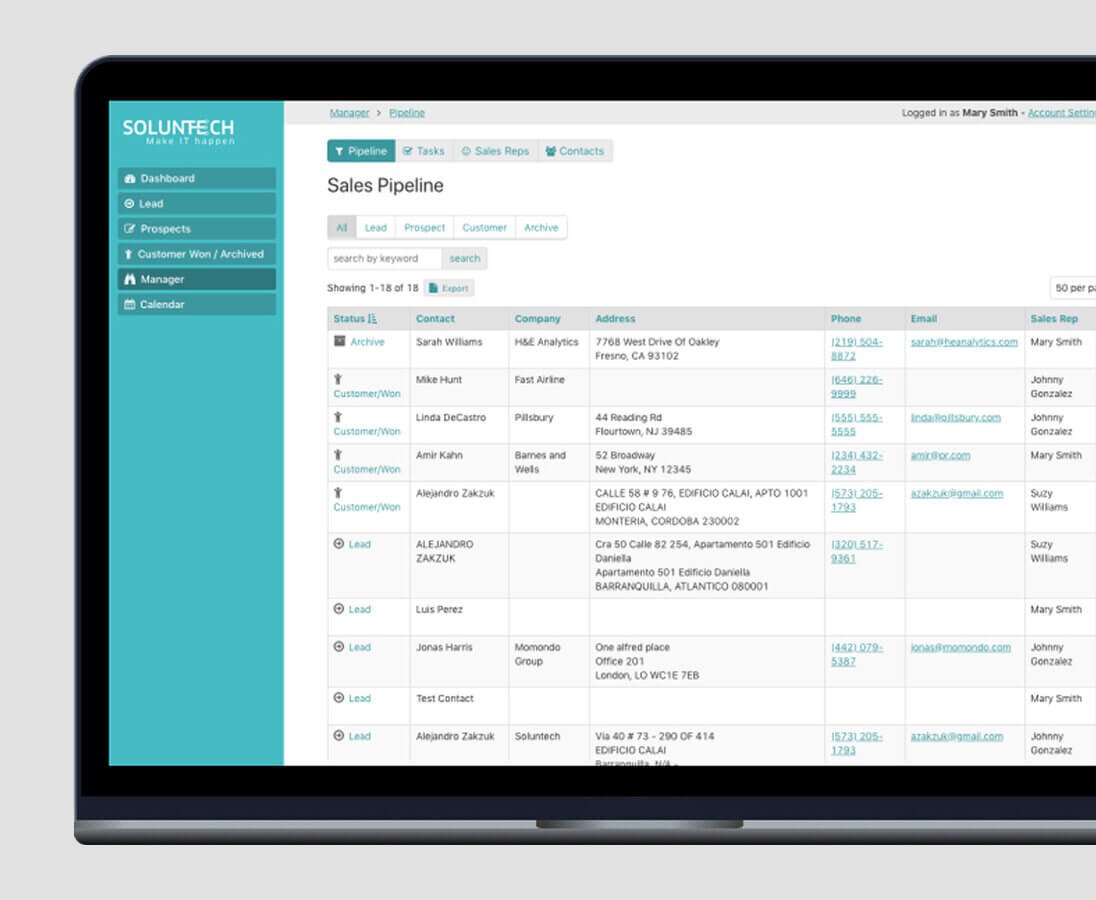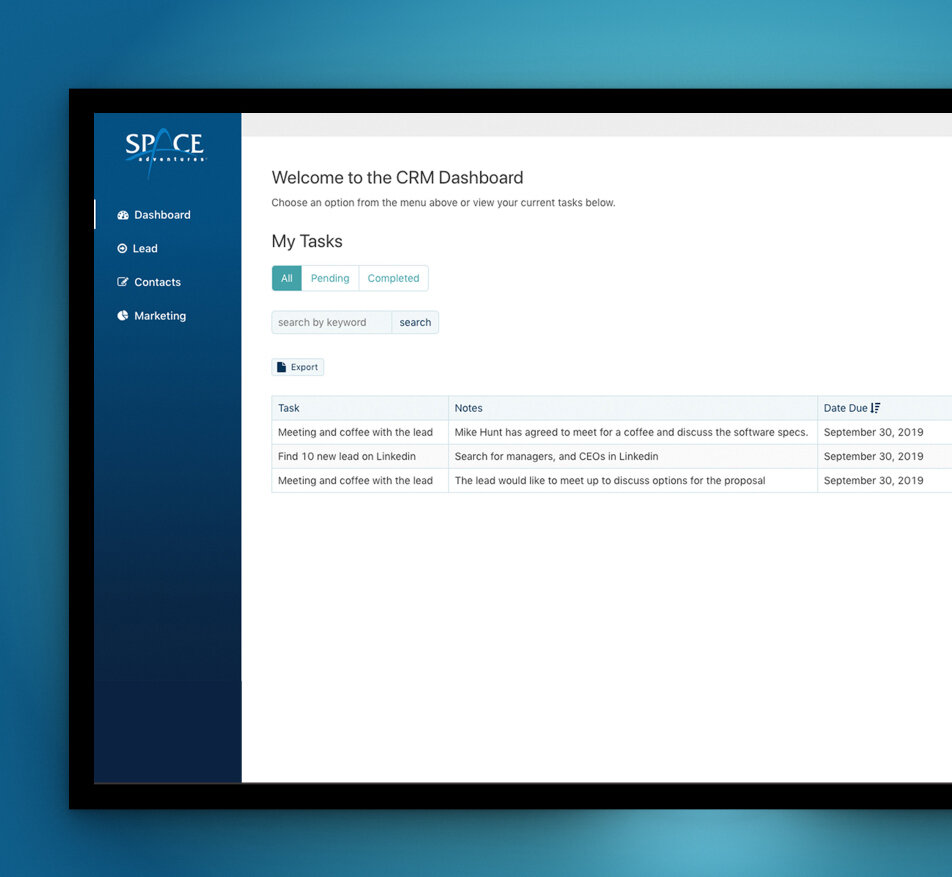How To Create a Custom CRM Software
Customers are essential pillars of any business, and a customer relationship management (CRM) software is a tool that can be used to connect with them more effectively. The market’s crowded with pre-packaged CRMs, but it can be difficult to find one that suits the exact needs of your company—that’s why so many business owners prefer custom-built CRMs. Let’s take a look at how you can create a custom CRM software.
What Is a CRM?
A CRM system is the most efficient way to store critical information about a company’s customers. With this software in place, it’s possible to follow up with potential customers throughout their entire route starting from the initial contact. CRMs are ubiquitous due to how useful they are; in fact, 91% of companies with over 10 employees use a CRM.
But sometimes your business needs more than the simplest features. A custom-built CRM software can also measure the effectiveness of sales tactics and optimize the efforts carried out by the marketing department to obtain quality leads, which translates into larger profits. Knowing how to create a CRM software can set you apart from the competition.
Types of CRMs
Operational
Operational CRMs are great tools for businesses that are focusing on automating workflows and streamlining existing business processes. These CRMs also have sales-oriented features such as a dedicated pipeline, along with a helpdesk for customer service.
Collaborative
As the name might imply, collaborative CRMs are packed with features that can significantly boost a business’ capacity for communication. This includes forums and boards for discussions and memos, along with real-time chat rooms and file-sharing capabilities. If you know how to create a custom CRM software, you can also customize these community features to suit your particular needs.
Analytical
According to Gartner, 90% of business professionals agree that data analysis is crucial for successful businesses, particularly for those operating online. Analytical CRMs fill this gap with dedicated tools that provide insight into a customer’s journey, even measuring time spent on pages and the number of clicks taken to arrive at a purchase.
What can a custom-built CRM do for your company?
Store and manage customer data in a single place
Improve customer satisfaction and loyalty
Optimize marketing and sales processes
Maximize ROI
Improve internal communication
Get valuable and detailed insights into customer behavior
Manage leads
Manage the customer base
Optimize customer service
Easily navigate lots of customer data
Generate reports to evaluate sales and marketing performance
Why create a custom-built CRM?
There are quite a few reasons why you may want to learn how to create a custom CRM software (or partner with a team to help you create it). There are different types of CRM systems on the market, and many businesses use models that are close to their type of business.
However, pre-packaged CRMs can never be adapted to the fullest since each business model is different, and hundreds of variables make it difficult for pre-built CRM systems to provide a perfect fit. It’s like trying to buy a suit off the rack that fits you perfectly—it never quite does, and it’s best to work with a tailor. A custom CRM is built according to the company’s unique specifications.
A custom-built CRM system allows the user to navigate properly according to the processes and flows that the company establishes, thus avoiding unnecessary characteristics that reduce efficiency.
Therefore, if your company meets these 5 needs, you should consider learning how to create a custom CRM software:
1. Unique and complex business model
If the processes within your company are unique for a particular industry, no CRM will be able to adapt to your needs. This encompasses the sales process (especially if it’s mixed), UI-UX design, how money is collected from each client, and how commissions are paid to the suppliers and employees.
A custom-built CRM system will include all of the functions that the organization needs, from the terminology to the work processes of your team on how and what they sell.
2. Frequent collaboration
Hiring an agency that knows how to create a custom CRM software can boost collaboration and save your organization a substantial amount of money. Most CRM services require a fixed monthly fee that usually restricts access to a few users, and to obtain more you must pay extra, naturally leading to higher operational costs.
If your company prioritizes collaborative work between different areas, then all of them must have access to information located in the CRM system. A custom-built CRM system has no user limits, so you won’t have to worry about restrictive access control.
3. Integration with other systems
The integration of a CRM means that it can be seamlessly connected to different platforms, such as a website or anywhere where information must be exchanged. If you know how to create CRM software, you can build a bespoke solution that integrates with the platforms that your business depends on. This can increase the productivity of multiple areas of the company simultaneously, such as marketing, sales, operations, and finance.
4. Leaner operations
Investing in a pre-built CRM package means buying into an ecosystem that will potentially have more or fewer features than what your business actually needs. Both possibilities are equally problematic. A pre-built CRM that’s dense with features that you don’t actually need means that you’ll be paying extra for a system that you won’t even use completely, not to mention the expenditure in staff training.
Here’s how creating a CRM software can help. Your business model or products don’t necessarily have to be unique to call for a custom-built CRM. Building this software ground up can help even conventional businesses cut the fat and operate with a system that equips them to do more with less.
5. A desire to scale
You’ve invested in a top-of-the-line pre-built CRM that promises all the latest features for a competitive price. Great! But what happens a year later when your business is ready to expand in scale and cater to a larger number of customers? You’ll suddenly find yourself mired in mounting fees and hidden charges.
A lack of support for scaling is why many businesses look into how to create a custom CRM software. Custom-built CRM helps you avoid those expensive new plans and add-ons, allowing for a simple scaling process that applies across multiple departments. You can increase the number of users and augment your analytics capabilities depending on what your business needs at any given moment.
How to create a custom CRM software:
The process of CRM creation can be broken down into 3 main phases: design, development, and deployment.
Design: When it comes to custom-built CRMs, ‘design’ refers more to the overall UX and features of the system rather than how it might look stylistically. You’ll want to work on a functional concept of what your ideal CRM might look like. This includes potential features and a workflow scheme. Ideally, you’ll want to have a working prototype by the end of this stage.
Development: This is the step where your design gets transformed into a functional system. Experienced consultants that know how to create superior CRM software will tell you that one of the most important parts of this step involves management. You’ll want to set realistic deadlines and ensure that you’re sticking to them because a delay at any step can severely impact development later on.
The development stage also includes testing. Once the platform is ready, you’ll want a quality assurance team to thoroughly test the custom-built CRM for any bugs or runtime errors. A glitchy CRM can end up costing a ton if it goes down, so it’s best to take your time with testing.
Deployment: Businesses that don’t know how to create CRM software often forget this important step. Successfully deploying a new CRM is a massive undertaking, and involves re-tooling and re-skilling staff to make them familiar with the new system.
Post-launch, it’s always a good idea to keep an eye on the new CRM’s performance. Careful monitoring helps businesses find out which features are most useful and which ones aren’t being used at all.
The number of steps and general complexity involved in creating a custom-built CRM can seem daunting, but there are multiple ways to simplify that process. From low code solutions to consultants, you’ll always have assistance along the way.
Common integrations for a CRM system are:
Google apps
Time tracking apps
Accounting apps
Project management apps
General email
The Soluntech team knows how to create a custom CRM software that can align with your company’s unique goals and requirements. Here are some examples of custom-built CRM systems we’ve created:
Sales pipeline manager with current status information
The CRM makes it easier to segment leads according to different variables and focus marketing campaigns more assertively, nurturing them throughout the sales process.
Task manager to keep track of the sales pipeline
Sales representatives can easily follow up on each lead through different tasks with reminders to ensure that it goes through the entire sales funnel.
FAQ
How can I tell if my business needs a custom-built CRM?
Many businesses will likely be fine with a pre-built CRM. However, it’s also just as likely that your business could grow rapidly with a platform that’s been built to support it. Getting a consultant to audit your business or app is one of the easiest ways to ensure your platform is up to speed and ready for growth.
How much does a custom CRM cost?
The final cost of creating a CRM software will depend on how complex the system is, as well as the amount of functionality that you’d like your CRM to have. These systems can be as rudimentary as a simple database or as complex as an automation workhorse powered by ML.
Grow With a Custom CRM
It’s important to bear in mind that if your business continues to grow, it will constantly need new features that can adapt to your goals. If you get a pre-built CRM system instead of a custom-built CRM system, you may run into problems along the way with your provider when attempting to scale the software.
Although some functionalities of default CRM systems can be customized and added through plug-ins, this should always be done by specialists in the field. That’s why it’s better to create a system from scratch with an agency that knows how to create a custom CRM software—you save time and money along the way. Contact an expert to get started today.




